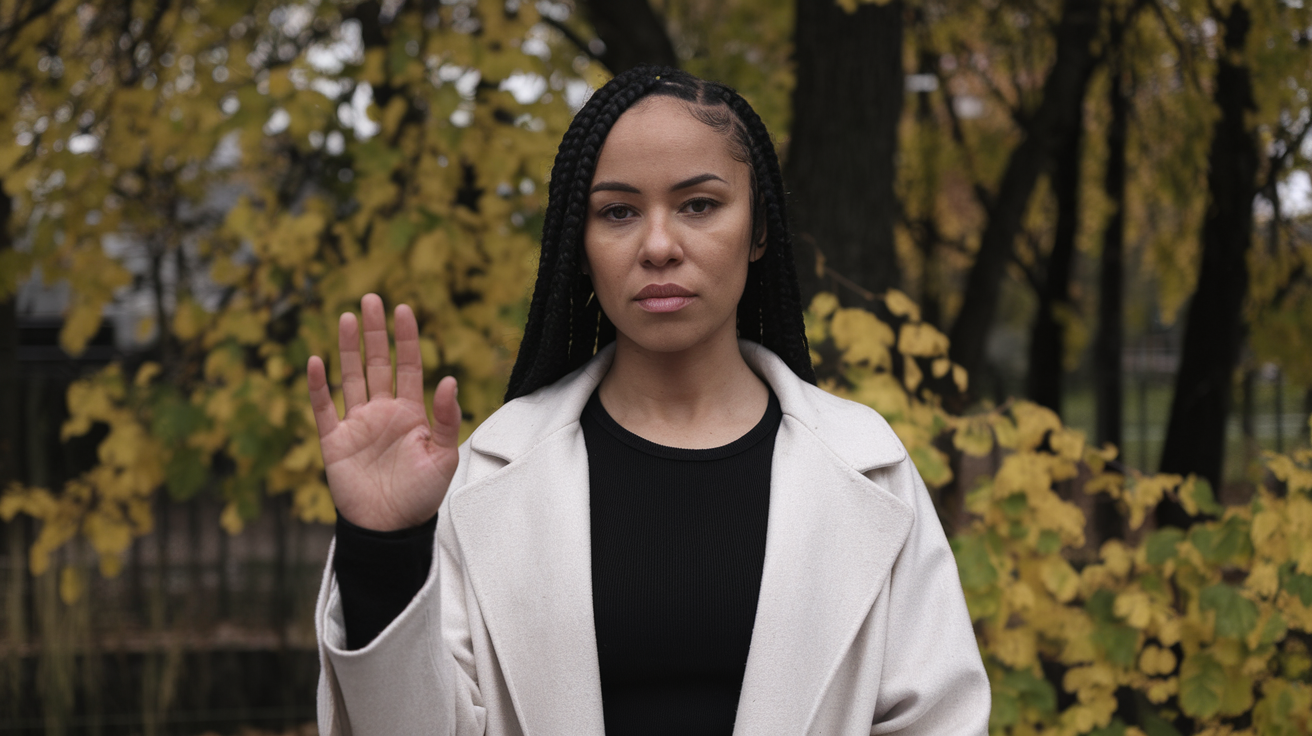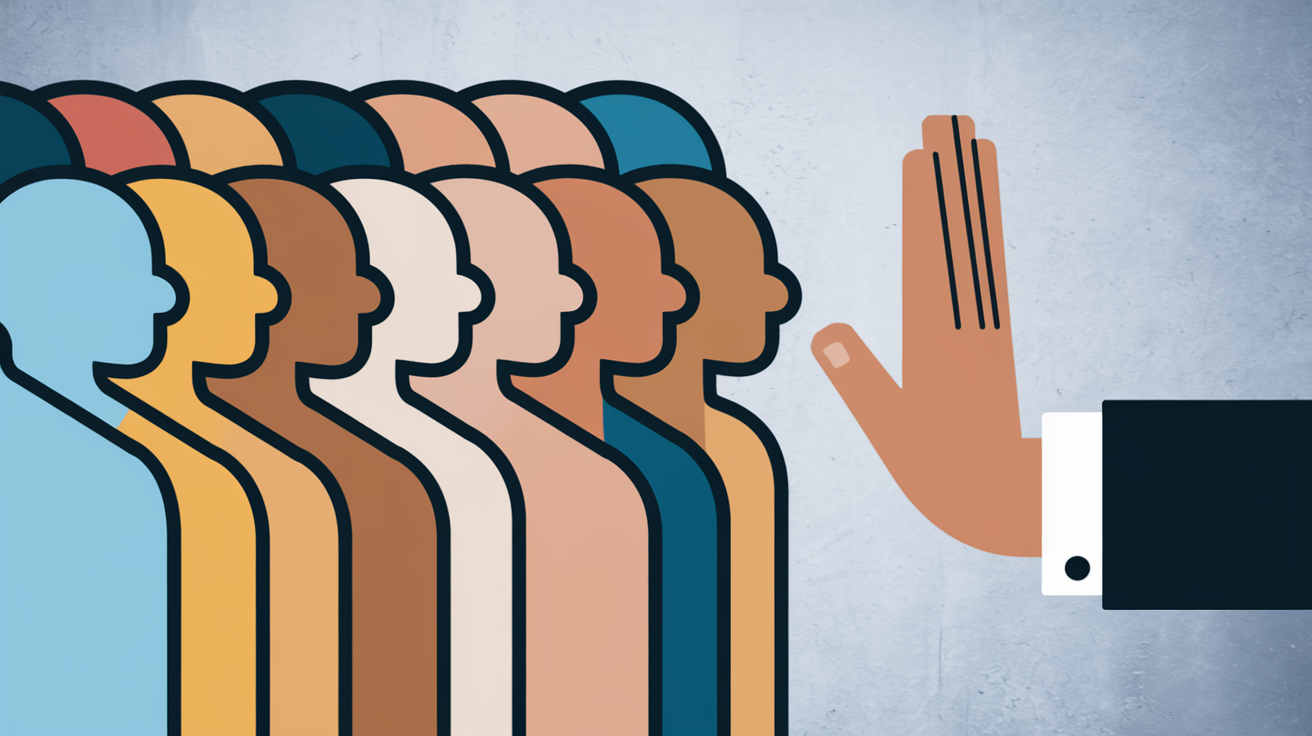Setting healthy boundaries is crucial for your mental well-being and personal relationships. Whether with family members, a romantic partner, or colleagues, clear boundaries help protect your physical space and emotional needs. So here’s how to set boundaries.
Many people struggle with establishing boundaries, often fearing they’ll upset others or appear selfish. But setting personal limits isn’t about building a brick wall – it’s about creating flexible boundaries that allow for mutual respect and understanding.
From managing work hours to protecting your alone time, boundaries come in different forms. Some might be hard boundaries that never bend, while others remain soft and adaptable to different situations.
Let’s explore how to establish and maintain healthy personal boundaries that honor both your own needs and those of the people around you. With practice and commitment, you can take charge of your life while nurturing meaningful connections.
What Are Boundaries?
Boundaries are rules or limits you set to protect yourself and your needs. They define what behavior you’ll accept from others and what actions you’ll take when someone crosses that line.
A boundary might look like telling your friend you need quiet time after work. For example, you could say: “I care about you, but I need an hour to myself when I get home before taking any calls.” This creates a clear personal time boundary.
Setting boundaries helps in specific situations where you feel stressed or uncomfortable. Maybe someone borrows money without returning it, or a friend shows up at your house without calling first.
Good boundaries make your personal relationships healthier. They’re not about being mean – they show others how to respect your needs while helping you avoid feeling angry or burned out later.
What Boundaries Mean in Relationships
Setting boundaries is a key step for mental and emotional health. It helps with self-care and keeps relationships healthy. It’s the only way to balance giving and receiving in all areas of life. Yet, setting boundaries can be tough, like saying no to those we love. But, with the right mindset, it can lead to better and more respectful relationships.
It’s important to know the different types of boundaries. These include physical, emotional, and mental boundaries. Each type is vital for our well-being. By understanding their role, we can make better choices in our relationships and focus on our needs.
Types of Personal Boundaries
- Physical boundaries: related to personal space and physical touch
- Emotional boundaries: related to emotional expression and intimacy
- Mental boundaries: related to thoughts, beliefs, and values
Why Boundaries Matter in Relationships
Boundaries are not just about saying “no.” They’re about respecting our own needs and desires. By setting clear boundaries, we can share our expectations and needs. This leads to more respectful and fulfilling relationships.
The Psychology Behind Setting Limits
The psychology of setting limits is complex. It involves understanding human behavior, emotional intelligence, and communication. By grasping this, we can learn to set and keep healthy boundaries in our relationships.
What’s the Difference Between Boundaries and Being Controlling?
Boundaries are about protecting your own personal life and emotional well-being, while controlling behavior tries to dictate others’ choices. Healthy boundary setting focuses on what you will or won’t accept in relationships, not on changing someone else’s behavior.
For example, a boundary might be “I need quality time alone after work to recharge.”
A controlling behavior would be “You can’t go out with friends after work because I need you home.” Boundaries are about your own limits, while controlling behaviors restrict others’ freedom.
Good boundaries allow both people in personal relationships to maintain their independence.
They’re like stop signs that protect your space while respecting others’ right to make their own choices. Even in romantic relationships, healthy boundaries ensure both partners maintain their own thoughts and interests.
The best way to tell the difference is to ask: “Am I setting this limit for my own protection, or am I trying to control another person’s choices?”
The Impact of Poor Boundaries
Poor boundaries can harm our mental health over time. They affect our emotional, physical, and professional well-being. Without healthy boundaries, we might end up in unhealthy or toxic relationships.
This can lead to a sad break that could have been prevented.
Some people feel they have no choice but to stay in toxic relationships. But this can cause serious emotional harm, like anxiety, depression, and low self-esteem. It’s key to spot the signs of poor boundaries and take steps to protect our mental health.
Emotional Consequences
- Anxiety and stress
- Depression and low self-esteem
- Feelings of burnout and emotional exhaustion
Physical Manifestations
Poor boundaries can also harm our bodies. They can cause chronic stress, illness, and weaken our immune system. It’s important to take care of our physical health by setting healthy boundaries.
Signs You Need to Establish Better Boundaries
Setting healthy boundaries is key for good relationships and emotional health.
Feeling overwhelmed, resentful, or taken for granted often means it’s time to rethink your boundaries. Last night, feeling drained after talking to someone might be a sign you don’t want to keep experiencing in your relationships.
Knowing when your boundaries are not working is the first step to better relationships.
Feeling overwhelmed, resentful, or used too often are clear signs. If you always put others first without thinking of yourself, it’s a sign your boundaries are not being respected. To make relationships better, setting clear boundaries and talking about them is crucial.
Here are some signs you need to set better boundaries:
- Feeling consistently drained or exhausted after interactions with others
- Feeling resentful or angry when others don’t respect your needs or desires
- Having difficulty saying “no” to requests or invitations
- Feeling like you’re being taken advantage of or used by others
By recognizing these signs and working on better boundaries, you can make your relationships stronger and feel emotionally better. Remember, setting boundaries is not selfish or controlling. It’s about respecting your needs and communicating them well to others.
How to Set Boundaries: Essential Steps and Strategies
Setting boundaries is key to healthy relationships. It’s important to do it with care and intention. Many struggle with setting boundaries, like on a second date, because they want to impress. But, clear boundaries help build trust and respect.
Identifying and clearly communicating your limits is crucial. This can be tough, like when you need to send a best breakup text. But, being direct and honest is vital for healthy boundaries.
Here are some essential steps to follow when setting boundaries:
1. Know What Your Values Are in Your Relationship
Knowing your values helps set better relationship boundaries. Your personal life and romantic relationships should match what matters most to you.
Think about what good things you want from your connections with others. Do you value quality time with family more than work? Maybe financial security is your top concern.
Different boundaries work for different people. Some need rigid boundaries around their personal time, while others prefer soft boundaries that bend a bit. The best way to figure this out is to write down your core values.
Your own boundaries should protect these values. At the end of the day, clear values make setting and keeping boundaries much easier.
2. Talking to Your Partner About Your Boundaries
Having good communication about relationship boundaries starts with picking the right time to talk. Choose a quiet moment when you both have personal time to share thoughts openly.
Be clear about your own boundaries without blaming or attacking. Maybe you need more quality time together, or perhaps you want to discuss sexual boundaries in your romantic relationships.
Share personal experiences that help explain your needs. Your partner might not understand at first, and that’s okay to make mistakes. Keep the conversation going with kind words and patience.
The best thing is to work together on boundary setting. This builds trust and shows respect for each other’s emotional well-being.
3. Setting Consequences for Them Violating Your Boundaries
When someone crosses your personal boundaries, you need clear consequences. This isn’t about punishment but protecting your emotional well-being and personal life.
Start with soft boundaries for first-time mistakes. Maybe your best friend keeps interrupting your lunch break – tell them you’ll leave next time it happens. Then follow through.
For more serious issues like unhealthy boundaries in romantic relationships, set rigid boundaries with firm consequences. This might mean taking time apart or ending certain activities together.
The best way to enforce consequences is to stay calm and consistent. Your boundaries deserve respect, and good consequences help others learn to honor them.
Additional Tips on Setting Boundaries
By following these steps, you can set a clear and respectful boundary. Remember, setting boundaries is not selfish. It’s about taking care of yourself and keeping relationships healthy.
- Using “I” statements to express your feelings and needs
- Being specific and direct about what you are and are not comfortable with
- Setting consequences for when your boundaries are not respected
Follow these tips and be consistent in your communication. This way, you can set strong, healthy boundaries. These will benefit your relationships in the long run.
Setting Boundaries in Different Relationships
Platonic Friendship Boundaries
Even your best friend needs to respect your boundary setting. Friendships work better when everyone understands how much time and energy they can give to each other.
Tell your close friend if you need space or can’t always answer their messages right away. Your personal time matters just as much as the quality time you spend together.
Good friends respect each other’s different boundaries. Maybe you don’t like lending personal belongings, or perhaps you prefer keeping certain parts of your personal life private from social media.
Watch for friends who act like people pleasers or ignore your boundaries. True friendship means accepting and supporting each other’s emotional well-being.
Boundaries in the Workplace
Work needs clear boundaries to protect your personal life and emotional well-being. Your lunch break belongs to you, and after-hours emails can usually wait until the next time you’re at work.
Don’t be a people pleaser at the office. It’s okay to say no to extra tasks when you already have much time committed to other projects. Set rigid boundaries around your personal time and stick to them.
Good boundaries at work help your financial security. They show others you value both your job and your home life. The best way to maintain work boundaries is being professional and consistent.
Keep your own thoughts about non-work topics private. Friendly chats are fine, but avoid sharing too many details about your personal lives.
Dealing with Boundary Pushback
Setting boundaries can lead to pushback from others. This is common, even in the best relationships. Both partners want open communication and respect. But, boundaries are key to a healthy relationship.
Even a great boyfriend might unintentionally cross boundaries. This can cause resentment and frustration. It’s important to handle these situations well.
When faced with pushback, managing guilt and resistance is crucial. Talk openly about your boundaries and why they matter. Be clear and direct in your communication. This approach respects both parties’ feelings and needs.
Managing Guilt and Resistance
- Recognize that boundary pushback is a normal response to change
- Acknowledge the other person’s feelings and concerns
- Reiterate your boundaries clearly and assertively
By being firm and maintaining boundaries, you build a stronger relationship. Setting boundaries isn’t about being confrontational. It’s about being clear about your needs and expectations.
Benefits of Setting Boundaries
Setting boundaries brings many good things into your life. Your personal relationships grow stronger when everyone knows what to expect from each other. Good boundaries help you feel safe and respected.
Physical barriers and hard boundaries protect your space and energy. You’ll notice a little bit more peace in your life when you’re clear about your needs. Setting boundaries also helps others understand how to treat you better.
From personal experience, boundaries make specific situations easier to handle. You won’t feel pressured to say yes when you mean no. Your intellectual boundaries guard your ideas and beliefs while respecting those of others.
The next step after setting boundaries is often surprising. You’ll have more energy and feel in a good place mentally. Great time management becomes natural because you control your person time better.
Setting boundaries might feel uncomfortable at first time. But main types of boundaries – from emotional to financial boundaries – create a foundation for healthier living. Your life becomes more balanced and authentic when you honor your limits.
Final Thoughts
Setting healthy boundaries takes time and consistent practice, but the results are worth the effort. As you’ve learned to respect your own needs and communicate your personal limits, you’ve taken an important step toward better relationships.
Remember that different situations may require flexible boundaries, while others need hard boundaries that don’t bend. Whether dealing with work environment challenges or navigating family gatherings, your comfort level should always be the priority.
The bottom line is that maintaining healthy personal boundaries isn’t selfish – it’s crucial for your mental well-being and the quality of your relationships. By being clear about your own space, time boundaries, and personal values, you create opportunities for mutual respect and deeper connections.
Stay committed to enforcing your boundaries, even when it feels uncomfortable. With each boundary you maintain, you’re taking better care of your own needs and teaching others how to respect you.
Frequently Asked Questions
Why is it hard for me to set boundaries?
Many people struggle with boundaries because they’re conditioned to be people pleasers or fear losing relationships. Growing up without healthy boundary examples, especially from family members, can make setting personal limits feel uncomfortable.
Setting boundaries often triggers guilt and anxiety about other people’s reactions. Additionally, those used to putting others’ needs first may struggle to recognize their own feelings and comfort level.
Remember that learning to set healthy boundaries is a crucial part of personal growth. While initially challenging, it gets easier with practice and leads to better mental well-being.
What personality type has a lack of boundaries?
People pleasers and those with codependent tendencies often struggle with lack of boundaries. These personality types prioritize others’ needs over their own personal limits and mental well-being.
Other common traits include being overly empathetic, having low self-esteem, or growing up in environments without healthy boundaries. These individuals often need support learning to recognize their own feelings and set appropriate boundaries.
Professional help, like working with a family therapist, can help develop better boundary-setting skills.
What are poor boundaries a symptom of?
Poor boundaries often indicate past trauma, emotional neglect, or growing up in dysfunctional family environments. These experiences can affect a person’s mental well-being and ability to recognize their own feelings.
Common symptoms include difficulty saying no, oversharing personal information, and ignoring personal needs. This pattern often requires professional help and therapy to develop healthy boundaries and improve relationship dynamics.
Remember that boundary issues can also signal anxiety or depression that needs additional support.
What kind of person doesn’t respect boundaries?
People who frequently violate boundaries often have narcissistic traits or controlling personalities. These individuals often ignore personal limits and comfort levels, pushing past both soft and hard boundaries.
Common signs include pressuring others after hearing “no,” demanding excessive time or personal information and disregarding physical space. People with boundary violations in their own past may unconsciously repeat these patterns in current relationships.
Without professional help, these behaviors can damage relationships and others’ mental well-being.
Sources:
https://pmc.ncbi.nlm.nih.gov/articles/PMC10786006/
https://journals.sagepub.com/doi/10.1177/02762366231158274
https://pmc.ncbi.nlm.nih.gov/articles/PMC8382156/
- 17 Simple Leprechaun Trap Ideas Your Kids Will Love! - January 19, 2026
- 15 Refreshing Spring Simmer Pot Recipes to Celebrate the Season - January 9, 2026
- Why Do People Host Using Vrbo Instead of Airbnb? - October 19, 2025










